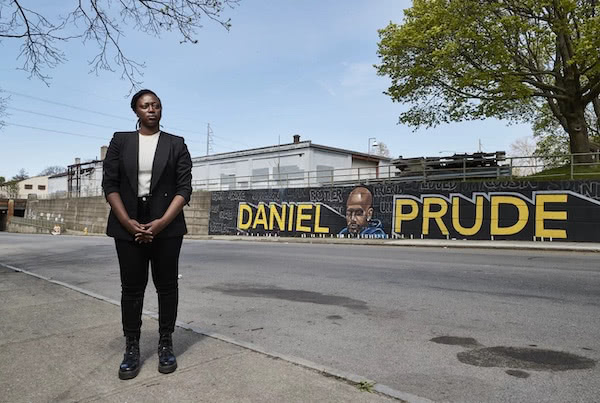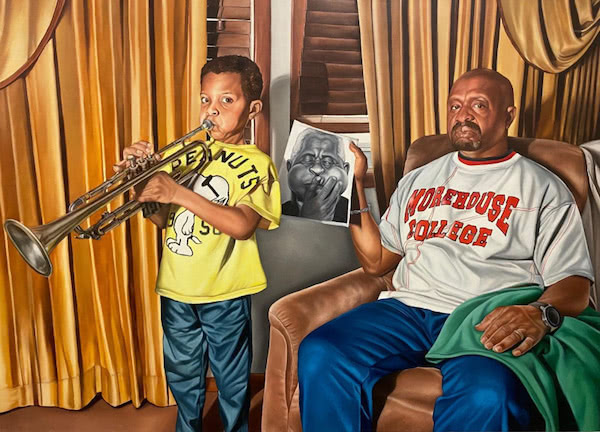Reimagining Police in Rochester

NPR speaks with Black Lives Matter activist Stanley Martin and other Rochester residents about public safety:
Constant friction between people of color and the Rochester police “informed my position as finally saying, you know what, I am an abolitionist, and I do not believe that we need prisons or police to solve the problems we have.”
Martin, now running for city council in an effort to create change from the inside, is careful to use the phrase “reimagining public safety” when speaking with voters.
Martin said the police would only gradually be dismantled and replaced; people trained to deal with mental health crises, for example, might have been the ones to show up for Prude. When force is truly necessary, there might be a security force similar to present-day police but with better training, she said.
I like her approach. Demands to abolish or defund the police scare a lot of folks, whereas “reimagining public safety” sparks curiosity: “What do you mean by that?”
Tarana Burke on Me Too, Black women, and more
Shamira Ibrahim interviews the Me Too movement founder for The Cut:
I think people are genuinely uplifting Black women, but it is empty. They thank us, talk about our magic and all of us these other little things, but every one of those are connected to our labor. There’s no massive movement to just let us be. We’re not teaching you or lifting you or saving you or liberating you, we’re just existing, and it is exhausting. But more than exhausting, it is killing some of us.
As an alternative to joining an anti-racist book club, Burke proposes a simple and far more impactful way for well-meaning whites to lend their support:
The empathetic part of me gets seeing something so tragic and feeling helpless, but you watch them turn to Black people and say, “Help us, what should we read, who should we talk to, who should we follow?” All I saw was white people saying, “Teach me.” There was nobody saying, “My God, Black people need a rest.”
So yes, read your little books, check off your little list, join your little clubs, I don’t care. Get your bag that says I’m an anti-racist. If you have not successfully even attempted to engage with Black humanity — and that doesn’t happen on Instagram — then I don’t care about your anti-racist training. It is illegitimate to me and just something to make you look good.
What reparations could look like
P.R. Lockhart, reporting for NBC News:
As the Biden administration promises to confront structural racism and inequality, a growing number of Democratic lawmakers have given their support to H.R. 40, a decades-old bill first introduced by Rep. John Conyers, D-Mich., in 1989. The bill would create a commission to study slavery and discrimination in the United States and potential reparations proposals for restitution.
In April, H.R. 40 moved out of committee for the first time, potentially setting up a floor vote on the legislation.
The Bleak Prescience of Richard Wright
Author and Princeton University professor Imani Perry, reviewing Wright’s previously unpublished novel The Man Who Lived Underground for The Atlantic:
It’s impossible to read Wright’s novel without thinking of this 21st-century moment, when we urgently assert, “Black lives matter.” We live with cycles of repeated violence; the terror of Black innocents being killed is all around us and in our consciousness. Starting in the 1940s, Ellison and Baldwin criticized Wright for his insistence on dramatizing this ineluctable subjugation; they saw Wright himself as submitting, in the process, to Black oppression in America. They believed, each in his own fashion, that Black literature ought to capture hope, possibility, beauty, and endurance. Transcendence and, more important, transformation were possible until they weren’t. Now the tragic absurdity of Fred’s life seems all too familiar. We see it on our screens regularly: the snuff films of white supremacy. Perhaps we have too readily judged Wright’s bearing of witness to be reductively stark and fatalistic. What he observed is still happening, despite all those generations of unyielding hope.
It’s Time to Give Black Barbecue Culture the Attention It Deserves
Culinary historian and author Adrian Miller in an essay for Bon Appétit:
I tuned in for the show. By the time the credits rolled, though, my mouth was hanging open—not from an appetite for barbecue but because I was stunned that not one single African American had been interviewed on camera. I saw shots of Black people in the background doing the actual work, but they were anonymous and voiceless. Today it may seem naive, but I recall thinking, as I turned off the television, “Is this what Black barbecuers have become? They’re just B-roll footage now?”
A Gallery Featuring Only Artists of Color Feels Like Change

Robin Pogrebin, writing for the New York Times:
“It had the feeling of a warm family gathering on a day in the park,” said Alysia Cortez, describing the first of her three visits to the show, “Shattered Glass,” at Jeffrey Deitch Gallery in Hollywood. “It is magical to see Black and brown people look at the walls and see themselves. I saw a couple show up with their pit bulls, I saw aunties come around to see what’s going on, and I saw so many kids.”
‘I say to myself that I never lose, that I only learn.’
Just a 10-year-old chess master dropping jewels.
Rejoicing again
Scroll down, press play.
Pass the mic, spread love
Ms. Patti gets us started, Ms. Knight takes us home.
Thanks for reading. See you next week.
